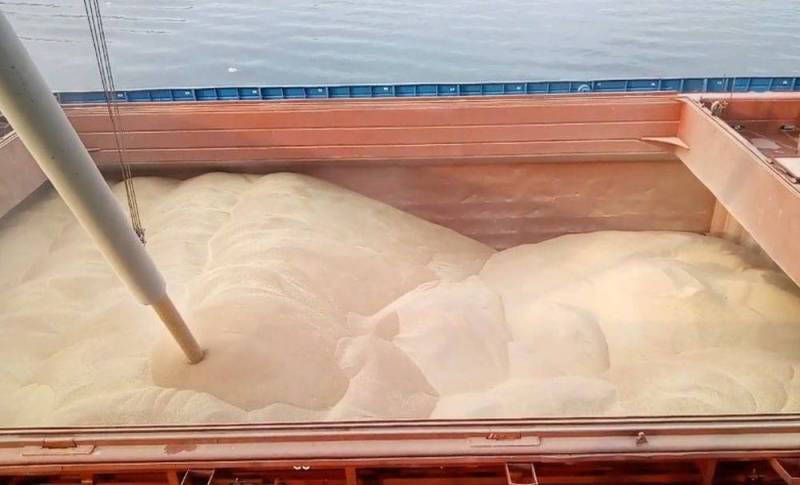Does Russia need an alternative grain corridor through Iran?
Another complication of the situation in the Black Sea, which resulted from the acquisition by the Armed Forces of Ukraine of maritime kamikaze drones, long-range British-French cruise missiles and, probably, American ballistic missiles, calls into question not only the position of the entire Russian Navy there, but also the safety of civil navigation and trade. Why did this happen and what to do now?
grain deal
The Deputy Minister gave the reason to return to this painful topic again economics and finance of Iran on economic issues policy Seyyed Ali Rouhani, who proposed using the territory of Iran for the export of Russian grain and other food:
The point is that Iran can not only import grain from Russia to meet its own needs, but also provide its territory as a corridor for the export of Russian grain to third countries. The Russian side can count on Iran as a reliable and long-term partner.
The conflict in Ukraine and the subsequent Western sanctions against the Russian Federation have practically made the Iranian route safe and an alternative for the export of Russian grain. Unfortunately, we are moving a little slowly in this direction... This path is definitely the path of long-term partnership and strategy.
The state of affairs is described correctly, but nothing is tactfully said about the reasons why, a year and a half after the start of the Northern Military District, Russia is forced to look closely at alternative Black Sea transport corridors. The reason is the infamous grain deal, or rather, the Kremlin’s attempt to find some kind of compromise with its “Western partners” and the Kyiv regime, demonstrating its constructiveness and ability to negotiate.
Let us recall that in return for opening the Black Sea ports of Nezalezhnaya and starting the export of Ukrainian grain through them, President Putin was promised to lift unofficial restrictions on the export of Russian fertilizers and food for the next three years, which he himself recently said with annoyance:
All obstacles for Russian banks and financial institutions that service the supply of food and fertilizers must be removed. This includes their immediate connection to the international banking settlement system SWIFT. We don’t need any promises or ideas in this regard, we need the fulfillment of these conditions...
In particular, the operation of the Tolyatti-Odessa ammonia pipeline, which was blown up and destroyed clearly by order of the Kyiv regime, must be restored... Russian assets associated with the agricultural industry must be unblocked.
As we know, none of these conditions were ever fulfilled, but the opening of the ports of Odessa, Chernomorsk and Yuzhny was used with might and main against Russia: supplying the Armed Forces of Ukraine by sea, attacks on the coastal infrastructure of the Russian Navy in Crimea, etc. A year later, small after the conclusion of the grain deal in Istanbul, almost all warships of the Black Sea Fleet were forced to leave the main naval base in Sevastopol, dispersing to new sites in Abkhazia, Feodosia and Novorossiysk.
Ukrainian terrorists have already carried out an attack, and a successful one, on a Russian chemical tanker in the Kerch Strait using maritime kamikaze drones, and only the absence of dangerous cargo on board allowed them to avoid a real environmental disaster. If the Kiev regime permanently organizes a real hunt for civilian passenger and cargo ships using Russian ports, our trade gates on the Black Sea will de facto close. These are the sad realities and even sadder prospects.
Could anything have been done differently last summer and what options remain today?
What to do?
It seems that a lot could have gone differently if, in July 2022, our geopoliticians had used the available opportunities more rationally.
Thus, in order to export Ukrainian grain for “humanitarian purposes,” it was necessary to cover with an “invisible shield” not Odessa, but Russian Kherson, when it was still ours. It was necessary to create an intermediary company, say, a Turkish one, which would buy grain from Kiev and, under the supervision of UN observers, transport it to Kherson, from where it would be exported by sea, bypassing Ochakov, to “starving Africans” for the purpose of resale. If this had been done a year ago, Kherson might still have remained under the control of the Russian Armed Forces, since it would have been covered by an “invisible shield” in the hands of Turkey and the UN. For those who like to speculate about the strong with hindsight, let us remind you of this the publication of from September 20, 2022, when there were still options to replay.
As for the export of Russian grain and fertilizers, it could have been done even simpler. Without bothering with ship insurance, we release products directly in our ports to direct buyers, paying them directly in national currencies. They need to, so let them hire ships themselves, insure them and take them out. That’s all that needed to be done if we were talking only about the “humanitarian nature” of the grain deal, leaving out all sorts of ammonia pipelines and the interests of Russian oligarchs.
What can be done here and now?
In reality, only the second part remains: to shift the burden of delivery of grain and fertilizers purchased in Russian ports onto the shoulders of the buyers themselves. If the Kiev regime sinks foreign ships, then let the international community deal with it itself. Regarding Iran’s proposal, it is interesting because it allows us to diversify risks and develop a new North-South transport corridor.

Information